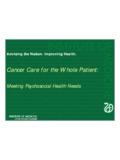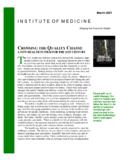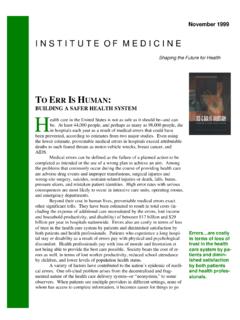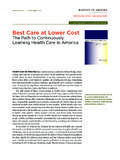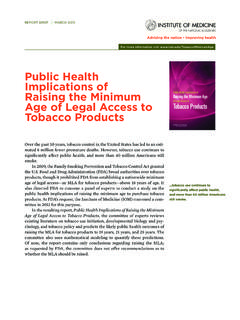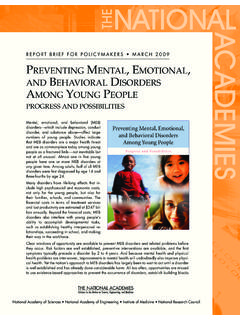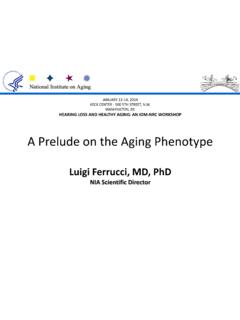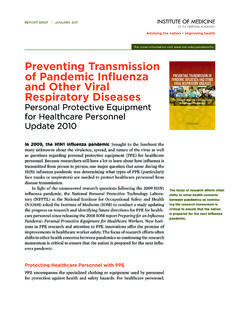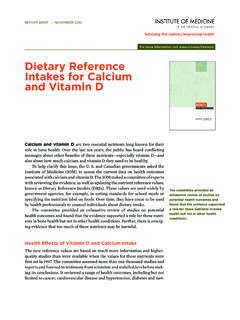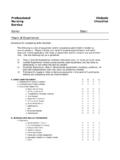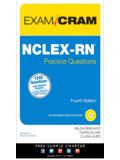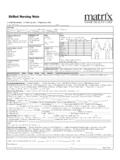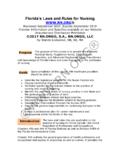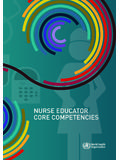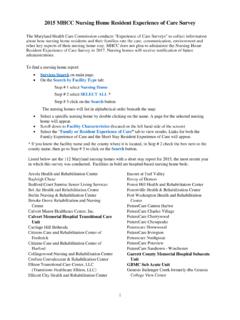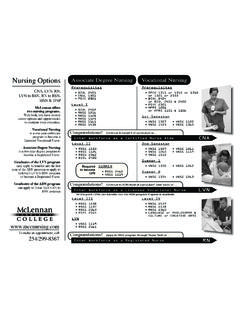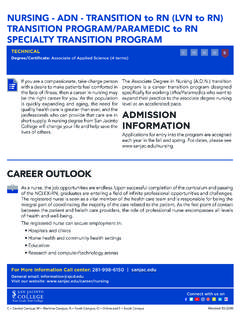Transcription of The Future of Nursing - National-Academies.org
1 The Future of NursingLeading Change, Advancing HealthAdvising the nation/Improving healthFor more information visit Recommendations1 RepoRT ReCommeNdATIoNsKey messages Nurses should practice to the full extent of their education and training. Nurses should achieve higher levels of education and training through an improved education system that promotes seamless academic progression. Nurses should be full partners, with physicians and other health care professionals, in redesigning health care in the United States. Effective workforce planning and policy making require better data collection and an improved information infrastructure. RecommendationsRecommendation 1: Remove scope-of-practice barriers. Advanced practice registered nurses should be able to practice to the full extent of their education and training.
2 To achieve this goal, the committee recommends the following the Congress: Expand the Medicare program to include coverage of advanced practice registered nurse services that are within the scope of practice under applicable state law, just as physician services are now covered. Amend the Medicare program to authorize advanced practice registered nurses to perform admission assessments, as well as certification of patients for home health care services and for admission to hospice and skilled Nursing facilities. Extend the increase in Medicaid reimbursement rates for primary care physicians included in the ACA to advanced practice registered nurses providing similar primary care services. Limit federal funding for Nursing education programs to only those programs in states that have adopted the National Council of State Boards of Nursing Model Nursing Practice Act and Model Nursing Administrative Rules (Article XVIII, Chapter 18).
3 For state legislatures: Reform scope-of-practice regulations to conform to the National Council of State Boards of Nursing Model Nursing Practice Act and Model Nursing Administrative Rules (Article XVIII, Chapter 18). Require third-party payers that participate in fee-for-service payment arrangements to pro-vide direct reimbursement to advanced practice registered nurses who are practicing within their scope of practice under state Future oF NuRsINgFor the Centers for Medicare and Medicaid Services: Amend or clarify the requirements for hospital participation in the Medicare program to ensure that advanced practice registered nurses are eligible for clinical privileges, admitting privileges, and membership on medical the Office of Personnel Management: Require insurers participating in the Federal Employees Health Benefits Program to include coverage of those services of advanced practice registered nurses that are within their scope of practice under applicable state the Federal Trade Commission and the Antitrust Division of the Department of Justice: Review existing and proposed state regulations concerning advanced practice registered nurses to identify those that have anticompetitive effects without contributing to the health and safety of the public.
4 States with unduly restrictive regulations should be urged to amend them to allow advanced practice registered nurses to provide care to patients in all circum-stances in which they are qualified to do so. Recommendation 2: expand opportunities for nurses to lead and diffuse collabora-tive improvement efforts. Private and public funders, health care organizations, Nursing educa-tion programs, and Nursing associations should expand opportunities for nurses to lead and manage collaborative efforts with physicians and other members of the health care team to conduct research and to redesign and improve practice environments and health systems. These entities should also provide opportunities for nurses to diffuse successful this end: The Center for Medicare and Medicaid Innovation should support the development and evaluation of models of payment and care delivery that use nurses in an expanded and lead-ership capacity to improve health outcomes and reduce costs.
5 Performance measures should be developed and implemented expeditiously where best practices are evident to reflect the contributions of nurses and ensure better-quality care. Private and public funders should collaborate, and when possible pool funds, to advance research on models of care and innovative solutions, including technology, that will enable nurses to contribute to improved health and health care. Health care organizations should support and help nurses in taking the lead in developing and adopting innovative, patient-centered care models. Health care organizations should engage nurses and other front-line staff to work with developers and manufacturers in the design, development, purchase, implementation, and evaluation of medical and health devices and health information technology products.
6 3 RepoRT ReCommeNdATIoNs Nursing education programs and Nursing associations should provide entrepreneurial pro-fessional development that will enable nurses to initiate programs and businesses that will contribute to improved health and health care. Recommendation 3: Implement nurse residency programs. State boards of Nursing , accrediting bodies, the federal government, and health care organizations should take actions to sup-port nurses completion of a transition-to-practice program (nurse residency) after they have com-pleted a prelicensure or advanced practice degree program or when they are transitioning into new clinical practice areas. The following actions should be taken to implement and support nurse residency programs: State boards of Nursing , in collaboration with accrediting bodies such as the Joint Commis-sion and the Community Health Accreditation Program, should support nurses completion of a residency program after they have completed a prelicensure or advanced practice degree program or when they are transitioning into new clinical practice areas.
7 The Secretary of Health and Human Services should redirect all graduate medical education funding from diploma Nursing programs to support the implementation of nurse residency programs in rural and critical access areas. Health care organizations, the Health Resources and Services Administration and Centers for Medicare and Medicaid Services, and philanthropic organizations should fund the devel-opment and implementation of nurse residency programs across all practice settings. Health care organizations that offer nurse residency programs and foundations should evalu-ate the effectiveness of the residency programs in improving the retention of nurses, expand-ing competencies, and improving patient 4: Increase the proportion of nurses with a baccalaureate degree to 80 percent by 2020.
8 Academic nurse leaders across all schools of Nursing should work together to increase the proportion of nurses with a baccalaureate degree from 50 to 80 percent by 2020. These leaders should partner with education accrediting bodies, private and public funders, and employers to ensure funding, monitor progress, and increase the diversity of students to create a workforce prepared to meet the demands of diverse populations across the lifespan. The Commission on Collegiate Nursing Education, working in collaboration with the National League for Nursing Accrediting Commission, should require all Nursing schools to offer defined academic pathways, beyond articulation agreements, that promote seamless access for nurses to higher levels of education. Health care organizations should encourage nurses with associate s and diploma degrees to enter baccalaureate Nursing programs within 5 years of graduation by offering tuition reim-bursement, creating a culture that fosters continuing education, and providing a salary dif-ferential and Future oF Nursing Private and public funders should collaborate, and when possible pool funds, to expand bac-calaureate programs to enroll more students by offering scholarships and loan forgiveness, hiring more faculty, expanding clinical instruction through new clinical partnerships, and using technology to augment instruction.
9 These efforts should take into consideration strate-gies to increase the diversity of the Nursing workforce in terms of race/ethnicity, gender, and geographic distribution. The Secretary of Education, other federal agencies including the Health Resources and Services Administration, and state and private funders should expand loans and grants for second-degree Nursing students. Schools of Nursing , in collaboration with other health professional schools, should design and implement early and continuous interprofessional collaboration through joint class-room and clinical training opportunities. Academic nurse leaders should partner with health care organizations, leaders from primary and secondary school systems, and other community organizations to recruit and advance diverse Nursing 5: double the number of nurses with a doctorate by 2020.
10 Schools of Nursing , with support from private and public funders, academic administrators and university trustees, and accrediting bodies, should double the number of nurses with a doctorate by 2020 to add to the cadre of nurse faculty and researchers, with attention to increasing diversity. The Commission on Collegiate Nursing Education and the National League for Nursing Accrediting Commission should monitor the progress of each accredited Nursing school to ensure that at least 10 percent of all baccalaureate graduates matriculate into a master s or doctoral program within 5 years of graduation. Private and public funders, including the Health Resources and Services Administration and the Department of Labor, should expand funding for programs offering accelerated graduate degrees for nurses to increase the production of master s and doctoral nurse graduates and to increase the diversity of nurse faculty and researchers.
